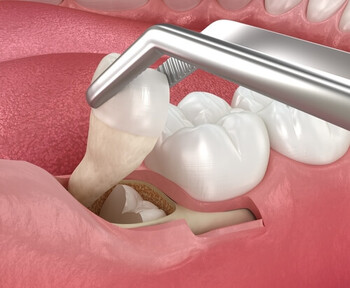Root canal treatment can save a severely damaged or infected tooth, allowing it to stay in place and continue supporting your oral health. However, in some cases, a root canal-treated tooth may fail due to various factors. An infected tooth that has been treated might continue to cause discomfort, or a new infection may arise if the root canal filling material fails. In such instances, removing root canal tooth can be the best way to protect your overall oral health.
What You Should Know About Root Canal Treatments
Root canals have long been a trusted method for treating an infected tooth. The root canal procedure involves removing the infected pulp, carefully cleaning the canal, and sealing it to protect against further decay. Yet, root canal treatments do not always guarantee permanent success. Sometimes, root canal treated teeth can crack, or adjacent teeth can be impacted by recurrent infections. In other instances, systemic disease or other health concerns can complicate healing.
Why Might a Root Canal-Treated Tooth Need Extraction?
There are various factors that might necessitate removing root canals. An infected or damaged tooth that does not respond well to treatment can cause ongoing discomfort and potentially affect the surrounding gum tissue and bone. Symptoms such as severe pain, swelling, and the presence of infection despite root canal treatments may be warning signs. In certain situations, dentists may recommend removing the root canal-treated tooth to protect overall health and prevent further decay or complications.
 Other reasons for extracting a root canal tooth might be:
Other reasons for extracting a root canal tooth might be:
- Fracture extending down the tooth’s root
- Persistent infection despite root canal treatment
- Damage making the tooth unrestorable
- Severe bone loss around the tooth
- Chronic pain that impacts daily life
- Effects on nearby teeth and your overall oral health
The Extraction Process: What to Expect
The extraction process for a root canal treated tooth is performed with precision and care. A dental clinic uses a thorough assessment of the tooth and surrounding tissues to decide the best approach. The area is first numbed with a local anaesthetic to ensure comfort.
The root canal treated tooth is then carefully removed, making sure to preserve the bone and gum tissue as much as possible. Dentists may employ special techniques, such as using platelet-rich fibrin to aid in promoting healing and preserving the area for future treatments. This approach can lower the risk of complications like dry sockets and encourages blood clot formation within the extraction site.
What to Expect After the Extraction
After removing a root canal tooth, it is vital to follow your dentist’s instructions closely. Healing will occur gradually as the blood supply restores itself and bone and gum tissue adapt to the change. To aid recovery:
- Stick to soft foods for a few days.
- Maintain a diligent oral health routine to protect the area.
- Avoid disturbing the blood clot.
- Stay alert for signs of infection or discomfort.
Your dentist will provide valuable insights about how long recovery should take and when you can consider further treatments, such as a dental implant or partial dentures, to replace the extracted tooth.
 Options After Removing a Root Canal Tooth
Options After Removing a Root Canal Tooth
Once the root canal-treated tooth has been extracted, it is crucial to consider replacement options. Missing teeth can affect adjacent teeth, altering bite alignment and causing further decay or bone loss. Dental implants, such as zirconia implants, have become a popular and durable option for replacing an extracted tooth. These implants support overall oral health by preserving bone and promoting stability within the mouth.
If a patient has systemic disease or other health conditions that complicate implant placement, a dentist can recommend alternatives such as partial dentures or a partial denture. These options can help maintain the aesthetics and functionality of the mouth while supporting overall health.
How a Healthy Mouth Supports Your Overall Health
Modern dentistry recognises the strong link between oral health and systemic disease. Infected teeth and root canal infections have been associated with more serious health conditions, including heart disease. The presence of infected pulp or damaged tissue can strain the immune system and affect blood supply throughout the body. By removing a root canal-treated tooth that is causing recurring infections, you may be making an important decision that supports both oral health and overall health.
Dentists prioritise patient well‑being, focusing not only on treating the infected or damaged tooth but also on assessing its impact on systemic health. Having a tooth extracted is often viewed as an investment in your long‑term health and overall quality of life.
Frequently Asked Questions
Is it painful to have a root canal-treated tooth removed?
Modern anaesthetic techniques ensure that removing a root canal-treated tooth is generally comfortable. Patients often compare it to a routine extraction, with only mild discomfort afterwards.
Will I need a replacement tooth immediately?
Not necessarily. The timeline for replacing an extracted tooth depends on your clinical situation and can be tailored with options like a dental implant or partial denture.
What can I do to reduce discomfort after the procedure?
Rest, follow your dentist’s aftercare instructions, use ice packs, and take prescribed medications to manage discomfort and support healing.
How long after a tooth extraction can I eat normally?
Most people can return to their usual meals within a few days, but it is best to stick with soft foods for the first 24 to 48 hours and gradually add harder options as the area heals. Always follow your dentist’s personalised instructions to help ensure a smooth recovery.
Moving Forward with Confidence: Making an Informed Decision
 If you are considering removing a root canal tooth, it is important to have an open discussion with your dentist about the various factors involved. This allows you to make an informed decision that takes into account both your oral and overall health needs. Your dentist can assess the status of the root canal treated tooth, evaluate adjacent teeth and surrounding tissues, and recommend the best path forward.
If you are considering removing a root canal tooth, it is important to have an open discussion with your dentist about the various factors involved. This allows you to make an informed decision that takes into account both your oral and overall health needs. Your dentist can assess the status of the root canal treated tooth, evaluate adjacent teeth and surrounding tissues, and recommend the best path forward.
Root canal treatments can save teeth and support a strong smile, but when a root canal-treated tooth becomes a source of recurrent infections or pain, removing the tooth may be the right solution. By understanding the benefits and implications of root canal removal, you can work with your dentist to maintain your overall health and achieve a brighter, more comfortable smile.
If you have questions or concerns about removing a root canal tooth, or if you’d like to book an appointment, contact Beyond 32 Dental at (02) 9158 6334. Our team is here to help guide you every step of the way towards a healthier, happier smile.
Note: Any surgical or invasive procedure carries risks. Before proceeding, you should seek a second opinion from an appropriately qualified health practitioner.
References
Cleveland Clinic. (n.d.). Root canal. Retrieved from https://my.clevelandclinic.org/health/treatments/21759-root-canal
Mayo Clinic. (n.d.). Dental implant surgery. Retrieved from https://www.mayoclinic.org/tests-procedures/dental-implant-surgery/about/pac-20384622
Healthline. (n.d.). Tooth extraction. Retrieved from https://www.healthline.com/health/tooth-extraction


 Options After Removing a Root Canal Tooth
Options After Removing a Root Canal Tooth



Recent Comments